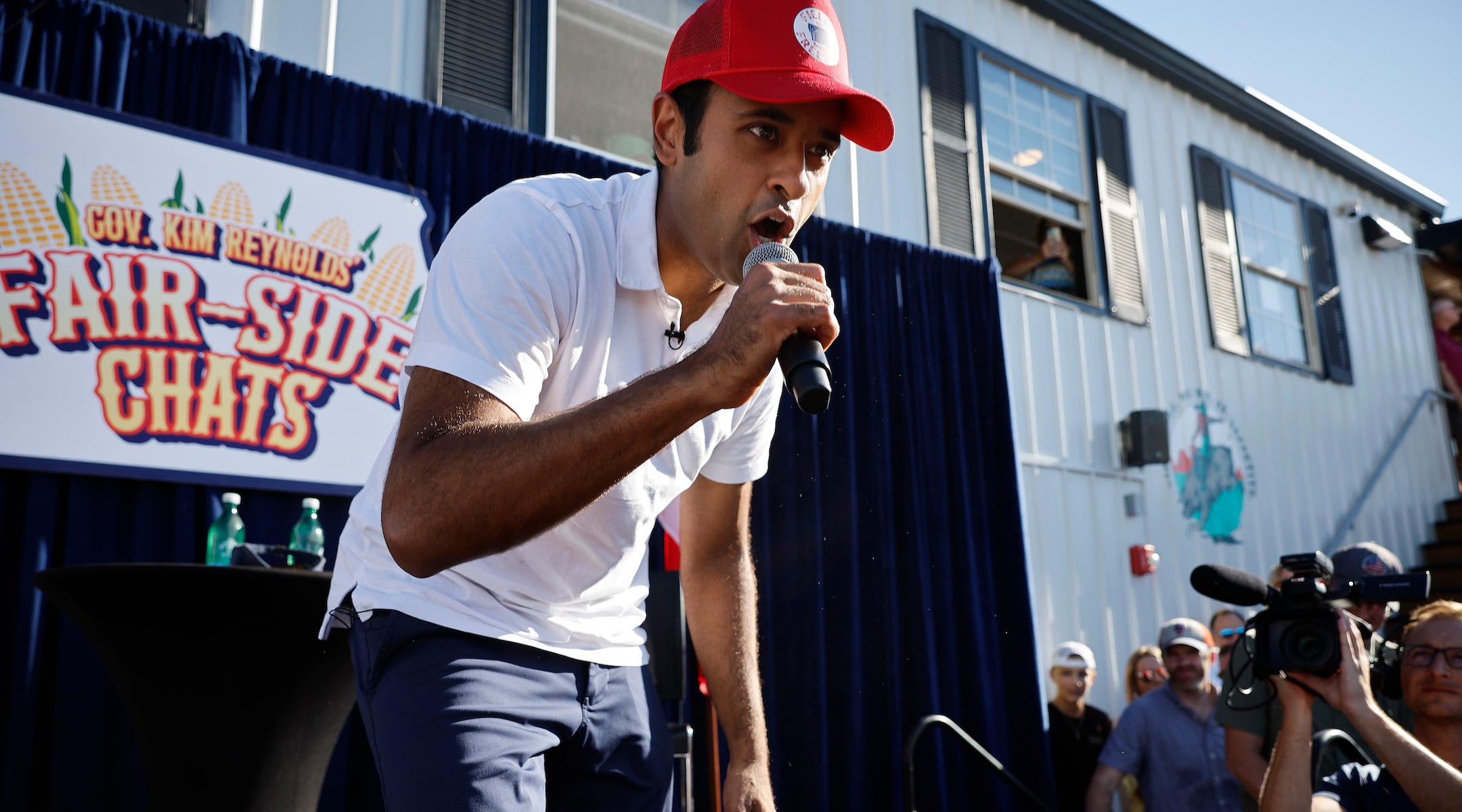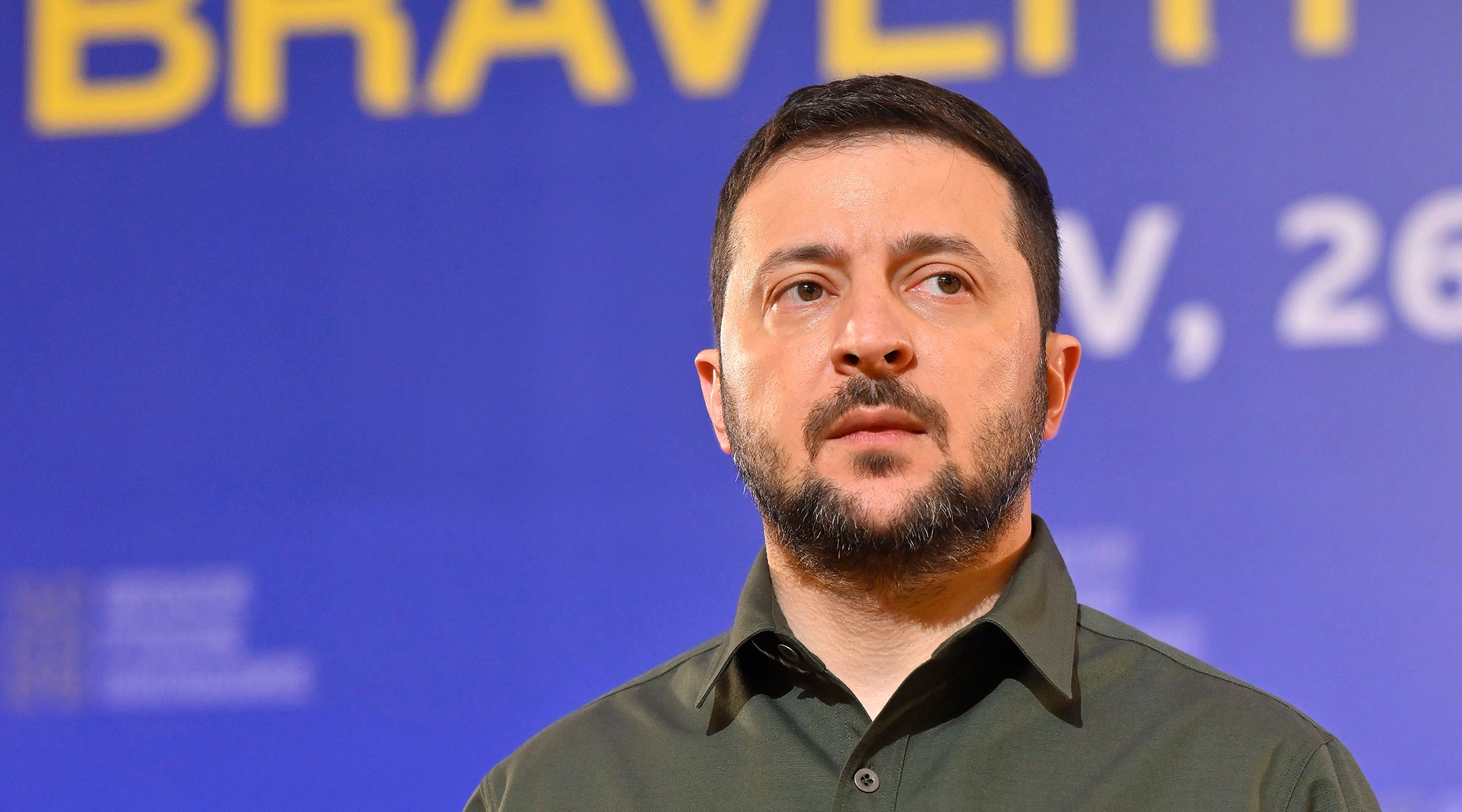6 Jewish things to know about Vivek Ramaswamy, the GOP candidate who has suggested ending aid to Israel
The businessman and longshot candidate was in a prestigious Jewish leadership society at Yale

Biotech millionaire and Republican presidential candidate Vivek Ramaswamy raps to Eminem’s “Lose Yourself” at the conclusion of one of Iowa Governor Kim Reynolds’ “Fair-Side Chats” at the Iowa State Fair on August 12, 2023 in Des Moines, Iowa. (Chip Somodevilla/Getty Images)
(JTA) – Ahead of the first Republican presidential debate, the candidate with the least political experience is making some of the biggest headlines — in part due to his views on Israel.
Vivek Ramaswamy, a 38-year-old biotech entrepreneur who has never held elected office, is seeing growing support for his long-shot candidacy. A recent poll placed him neck-and-neck in second place with Florida Gov. Ron DeSantis in the crowded GOP field, and the RealClearPolitics polling average places him in third.
Both candidates still lag far behind former President Donald Trump, the frontrunner. But Ramaswamy’s rising numbers mean he will share the center of Wednesday night’s debate stage on Fox News, and a recent memo from a pro-DeSantis Super PAC called on the governor to “take a sledgehammer” to Ramaswamy at the debate. DeSantis and the other hopefuls are expected to attack Ramaswamy’s many unconventional views, including a call to eventually end United States aid to Israel.
The Ohio-born businessman, whose net worth is estimated at more than $600 million, has based his campaign largely around tackling “wokeness,” a term that has become shorthand for conservative criticism of progressive values. But he’s also made headlines for more outré proposals, such as a pledge to eliminate the FBI and Department of Education, a call to require civics tests for young voters and a desire to learn “the truth about 9/11.”
Among his policies is a call to phase out U.S. aid to Israel by 2028, which separates him from the largely pro-Israel Republican establishment. Ramaswamy has also drawn attention for criticizing a bill signed by DeSantis that penalizes antisemitic harassment and has called to repeal a law banning religious discrimination in employment.
Before he became a presidential candidate, he was involved in a Jewish society at Yale University and benefited from a fellowship named after the brother of George Soros, the progressive Jewish megadonor.
Here’s what to know about Vivek Ramaswamy and the Jews.
He has floated ending U.S. aid to Israel.
In June, while campaigning in New Hampshire, Ramaswamy suggested that he would be open to ending aid to Israel as “part of a broader disengagement with the Middle East.” He later walked back those comments. But last week, he told actor and podcaster Russell Brand that he does, in fact, want to end U.S. aid to Israel in 2028, the year when the current U.S. commitment to provide $3.8 billion annually to Israel expires.
Ramaswamy said that decision would come as Israel receives recognition from more countries in the Middle East. Israel has signed normalization deals with several states in the region in recent years, a framework called the Abraham Accords, and is now pursuing a treaty with Saudi Arabia. Ramaswamy told the Jewish News Syndicate that he’d also like to spearhead Israeli accords with Indonesia and Oman.
“Come 2028, that additional aid won’t be necessary in order to still have the kind of stability that we’d actually have in the Middle East by having Israel more integrated in with its partners,” he said on a show Brand hosts on the video platform Rumble.
In advocating an end to the aid package, Ramaswamy has perhaps unintentionally aligned himself with the progressive left, whose members have increasingly supported conditioning or halting aid to Israel due to its treatment of Palestinians. Recently, New York Times columnist Nick Kristof argued that the aid dollars would be better spent helping poorer countries. And some voices on the right have also called for ending aid to Israel, arguing that it makes Israel beholden to the United States.
But those views are not shared by Ramaswamy’s most prominent Republican rivals. Former South Carolina Gov. Nikki Haley has criticized his position on aid to Israel, while DeSantis and former Vice President Mike Pence have made support for Israel a cornerstone of their campaigns.
The Republican Jewish Coalition has also implored Ramaswamy to change course. Matt Brooks, the group’s CEO, wrote in an open letter that “it makes much more sense to keep Israel in the family of countries with an interest in buying and using American capabilities” — which the aid package requires.
On other Israel-related policies, Ramaswamy is more in line with his party’s mainstream. Alongside supporting the Abraham Accords, he praised Trump’s decision to move the U.S. Embassy from Tel Aviv to Jerusalem and has attacked U.S. funding for programs benefiting Palestinians.
He says ‘donors’ are behind legislation combating antisemitism.
While Ramaswamy has called antisemitism “a symptom of something that is broken in our society,” he has spoken harshly about a law DeSantis enacted that penalizes antisemitic acts in Florida.
In June, he tweeted that DeSantis’ signing of the law, which criminalizes the distribution of antisemitic flyers on private property, was done “at his donors’ request.” After blowback from the conservative commentariat over his characterization of the law, he tweeted again about it — this time taking aim at “the censorship czars at Twitter” for appending a note to the tweet, which he partially blamed on “DeSantis megadonor David Sacks,” who is Jewish.
In a subsequent interview with Jewish Insider, Ramaswamy said the DeSantis bill didn’t pass his own “litmus test” because he saw it as “a viewpoint discrimination law.” He added that “bad speech” has to be countered with “free speech and open debate.” He pointed to a famous Supreme Court case permitting neo-Nazis to march in the heavily Jewish town of Skokie, Illinois, as an example of a bigotry-related issue that was “decided correctly.”
“I stand fiercely against bigotry and hatred and harassing speech,” he added.
He was in a Jewish leadership society at Yale.
Ramaswamy told JNS that he was one of the “key members” of Shabtai, a Jewish alternative to the “secret societies” at Yale University, where he attended law school. He said the society’s co-founder and rabbinical adviser, Rabbi Shmully Hecht, is a mentor of his.
Shabtai was founded at Yale in 1996 and receives extensive financial support from Israeli-American tech mogul Benny Shabtai, a major backer of Friends of the Israel Defense Forces. Though founded on Jewish values, the society has a diverse membership. It also counts Democratic New Jersey Sen. Cory Booker, who himself ran for president in 2020, among its alumni.
Ramaswamy describes his time with Shabtai as formative, and the group has touted him as an alum. Hecht did not respond to a request for comment.

Volodymyr Zelensky is pictured at a welcoming ceremony in Kyiv, Ukraine, Nov. 26, 2022. (Philip Reynaers / Pool / Photonews via Getty Images)
He claims Ukraine’s Jewish president is mistreating Jews.
While Ukrainian President Volodomyr Zelensky has earned admirers across the Western world for his conduct in his country’s war against Russia, Ramaswamy isn’t impressed.
The candidate told Jewish Insider that Zelensky — whose Jewish identity has been targeted by Russian propaganda — has himself mistreated Jews in Ukraine. Ramaswamy did not offer evidence to support that claim, which echoes claims that Russian President Vladimir Putin made to justify his invasion of Ukraine last year.
“I would just say that there are open questions about his treatment of religious minorities, including but not limited to Jews in Ukraine, that I think should be among the reasons we should stop short of holding him out as some sort of hero,” the candidate said. He did not provide examples when asked, though he said that Zelensky’s merging of all Ukrainian TV channels into a single station last year and his dissolution of political parties with ties to Russia would “create the risk for” antisemitism.
Ramaswamy is not the only Republican to criticize U.S. support for Ukraine, a stance that Trump and DeSantis have also questioned. He told Jewish Insider that he sees “protecting Israel” as one of the United States’ “far higher priorities.”
He wants to repeal a civil rights-era law forbidding religious discrimination in employment.
“Reverse racism is racism,” Ramaswamy recently stated in a list of “truths” he said were fundamental to his campaign. To that end, he has promised to repeal Executive Order 11246, a more-than-50-year-old law forbidding federal contractors from engaging in employment discrimination on the basis of race, gender, religion or national origin. “Time to restore colorblind meritocracy once and for all,” Ramaswamy wrote in the New York Post.
Signed into law by President Lyndon Johnson in 1965 as part of his flurry of civil rights legislation, the order has long been associated with affirmative action, a longtime bugbear of the right. But the order has also been drawn on by Jewish groups to protest employer discrimination against Jews. In 1966, the American Jewish Committee cited it to protest commercial banks that it said were virtually excluding all qualified Jews from working for them.
He reportedly paid a Wikipedia editor to remove a Soros family connection.
In 2011, Ramaswamy, the son of Indian immigrants, received a Paul & Daisy Soros Fellowship for New Americans — funding to help immigrants and first-generation Americans earn college degrees. The fellowship is named for the brother of progressive Jewish megadonor George Soros, a frequent target of leading Republicans who features in a range of antisemitic conspiracy theories.
Shortly before he announced his presidential campaign, Ramaswamy reportedly paid a Wikipedia editor to scrub his fellowship from his entry on the site. He has since gone on to criticize Soros and his family from the campaign trail.
This article originally appeared on JTA.org.
A message from our Publisher & CEO Rachel Fishman Feddersen

I hope you appreciated this article. Before you go, I’d like to ask you to please support the Forward’s award-winning, nonprofit journalism so that we can be prepared for whatever news 2025 brings.
At a time when other newsrooms are closing or cutting back, the Forward has removed its paywall and invested additional resources to report on the ground from Israel and around the U.S. on the impact of the war, rising antisemitism and polarized discourse.
Readers like you make it all possible. Support our work by becoming a Forward Member and connect with our journalism and your community.
— Rachel Fishman Feddersen, Publisher and CEO

























